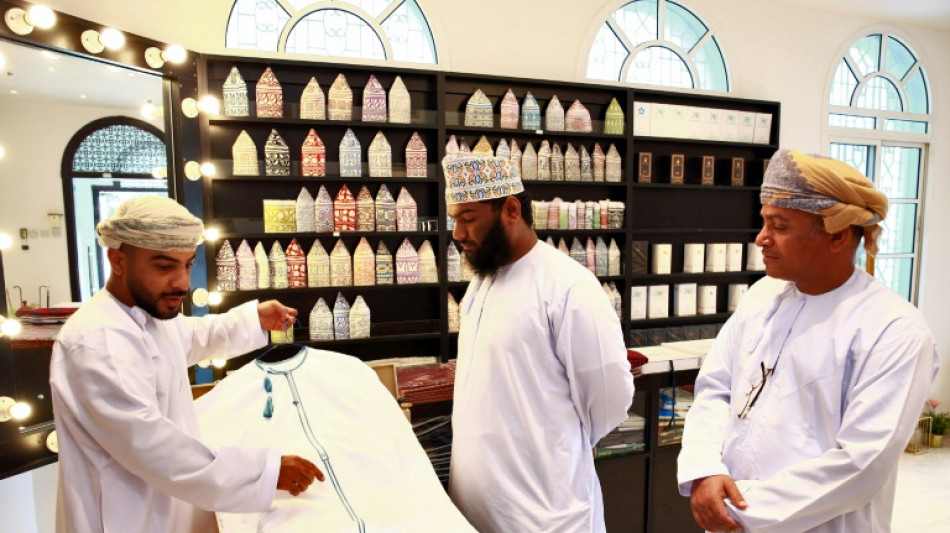
-
 Migrant's expulsion puts Washington Salvadorans on edge
Migrant's expulsion puts Washington Salvadorans on edge
-
Plan for expanded Muslim community triggers hope, fear in Texas

-
 Pakistan foreign minister due in Kabul as deportations rise
Pakistan foreign minister due in Kabul as deportations rise
-
White House touts Covid-19 'lab leak' theory on revamped site

-
 Dodgers star Ohtani skips trip to Texas to await birth of first child
Dodgers star Ohtani skips trip to Texas to await birth of first child
-
US senator says El Salvador staged 'margarita' photo op

-
 Ford 'adjusts' some exports to China due to tariffs
Ford 'adjusts' some exports to China due to tariffs
-
Thomas maintains two-shot lead at RBC Heritage

-
 US to withdraw some 1,000 troops from Syria
US to withdraw some 1,000 troops from Syria
-
Four killed after spring storms wreak havoc in the Alps

-
 Spurs' Popovich reportedly home and well after 'medical incident'
Spurs' Popovich reportedly home and well after 'medical incident'
-
Trump goes to war with the Fed

-
 Celtics chase second straight NBA title in playoff field led by Thunder, Cavs
Celtics chase second straight NBA title in playoff field led by Thunder, Cavs
-
White House site blames China for Covid-19 'lab leak'

-
 Norris edges Piastri as McLaren top Jeddah practice
Norris edges Piastri as McLaren top Jeddah practice
-
Trump warns US could ditch Ukraine talks if no progress

-
 Judge denies Sean 'Diddy' Combs push to delay trial
Judge denies Sean 'Diddy' Combs push to delay trial
-
80 killed in deadliest US attack on Yemen, Huthis say

-
 Lebanon says two killed in Israeli strikes in south
Lebanon says two killed in Israeli strikes in south
-
Trump says US will soon 'take a pass' if no Ukraine deal

-
 F1 success is 'like cooking' - Ferrari head chef Vasseur
F1 success is 'like cooking' - Ferrari head chef Vasseur
-
Cycling mulls slowing bikes to make road racing safer

-
 Macron invites foreign researchers to 'choose France'
Macron invites foreign researchers to 'choose France'
-
Klopp 'happy' in new job despite Real Madrid rumours: agent

-
 Alcaraz into Barcelona semis as defending champion Ruud exits
Alcaraz into Barcelona semis as defending champion Ruud exits
-
Vance meets Italy's Meloni before Easter at the Vatican

-
 Evenepoel returns with victory in Brabantse Pijl
Evenepoel returns with victory in Brabantse Pijl
-
Maresca confident he will survive Chelsea slump

-
 Mob beats to death man from persecuted Pakistan minority
Mob beats to death man from persecuted Pakistan minority
-
Lebanon says one killed in Israeli strike near Sidon

-
 Arsenal's Havertz could return for Champions League final
Arsenal's Havertz could return for Champions League final
-
US officials split on Ukraine truce prospects

-
 Client brain-dead after Paris cryotherapy session goes wrong
Client brain-dead after Paris cryotherapy session goes wrong
-
Flick demands answers from La Liga for 'joke' schedule

-
 'Maddest game' sums up Man Utd career for Maguire
'Maddest game' sums up Man Utd career for Maguire
-
Trial opens for students, journalists over Istanbul protests

-
 Gaza rescuers say Israeli strikes kill 24 after Hamas rejects truce proposal
Gaza rescuers say Israeli strikes kill 24 after Hamas rejects truce proposal
-
'Really stuck': Ukraine's EU accession drive stumbles

-
 'Not the time to discuss future', says Alonso amid Real Madrid links
'Not the time to discuss future', says Alonso amid Real Madrid links
-
74 killed in deadliest US attack on Yemen, Huthis say

-
 Southgate's ex-assistant Holland fired by Japan's Yokohama
Southgate's ex-assistant Holland fired by Japan's Yokohama
-
Vance meets Meloni in Rome before Easter at the Vatican

-
 Ryan Gosling to star in new 'Star Wars' film
Ryan Gosling to star in new 'Star Wars' film
-
Hamas calls for pressure to end Israel's aid block on Gaza

-
 Russia says Ukraine energy truce over, US mulls peace talks exit
Russia says Ukraine energy truce over, US mulls peace talks exit
-
58 killed in deadliest US strike on Yemen, Huthis say

-
 Museums rethink how the Holocaust should be shown
Museums rethink how the Holocaust should be shown
-
Three dead after deadly spring storm wreaks havoc in the Alps

-
 No need for big changes at Liverpool, says Slot
No need for big changes at Liverpool, says Slot
-
Bloody Philippine passion play sees final performance of veteran 'Jesus'


Dishdasha crackdown as Omani men face fines for rogue robes
A wave of foreign imitations and alternative styles has prompted Oman to take tough action to preserve its unique national dress, threatening thousands of dollars in fines for men who wear the wrong sort of dishdasha.
Dishdashas, the long, elegant robes that are a hallmark of the Gulf sultanate, have fallen prey to rising hemlines and elaborate embroidery, with some wearers also going for multicoloured designs.
The ministry of commerce and industry said the dishdasha's design is based on "certain criteria", stipulating it should be made mostly out of cotton with embroidery only on the collar, front slit and cuffs.
"The fabric must be a single colour," a ministry official told AFP, adding that white or neutral colours were preferred.
A person or manufacturer caught violating the dress code will be fined 1,000 Omani rials ($2,600), or double that in the case of a second violation.
While similar to the ankle-length robes worn by men in neighbouring countries, Oman's dishdasha stands out with its subtle embroidery around the neckline (mahar) which continues down a front central slit (shaq) over the chest.
In other Gulf countries, including Saudi Arabia and the United Arab Emirates, the long-sleeved robe is usually plain white and worn with either a white keffiyeh headdress or a red and white chequered one.
Omani men usually wear an embroidered brimless round cap (kumma) or a turban-style headdress, known as the massar, to complete their look.
The striking ensemble is a distinctive part of life in Oman, an ancient land known for its rich heritage, scenic coasts and stunning mountains.
- 'Personal freedoms' -
In a conservative country where criticism of the authorities is rare, some in the capital Muscat said while the recent announcement could be considered an infringement on personal freedoms, they understood the need to preserve national identity.
"The decision may be good to set certain standards but conflicts with personal freedoms," said Ouahib al-Jadidi, a 36-year-old entrepreneur.
"There are men who want to wear dishdashas that match their own tastes, but this ruling will prevent them from doing so."
Nabegh al-Qarni, who owns a store that sells dishdashas and accessories for men, said modifications to the traditional dress had become noticeable.
"Among the most notable changes is the shortening of the robe or larger patterns and embroidery," the 35-year-old told AFP.
"We have also seen different colours of dishdasha, instead of the traditional white, brown or black," he said, adding that Omani society, especially the older generation, is averse to this kind of change.
The effort to preserve Omani culture in the face of evolving tastes comes as the country grapples with social and economic change, introducing measures to attract foreign investment as it attempts to reduce its reliance on oil.
These have included developing its tourism industry, as well as issuing long-term residence permits for foreigners -- who make up 40 percent of its 4.5 million population -- while reserving certain jobs for citizens.
Omani economist Khalfan al-Touqi said the dishdasha was not only symbolic of the people and their heritage but also had "great economic importance".
"Recently, many shopkeepers have been bringing in dishdashas from abroad, from China and India, which often alter the robe," he said, adding the new measures also aim to encourage retailers to buy from local factories.
M.Furrer--BTB



